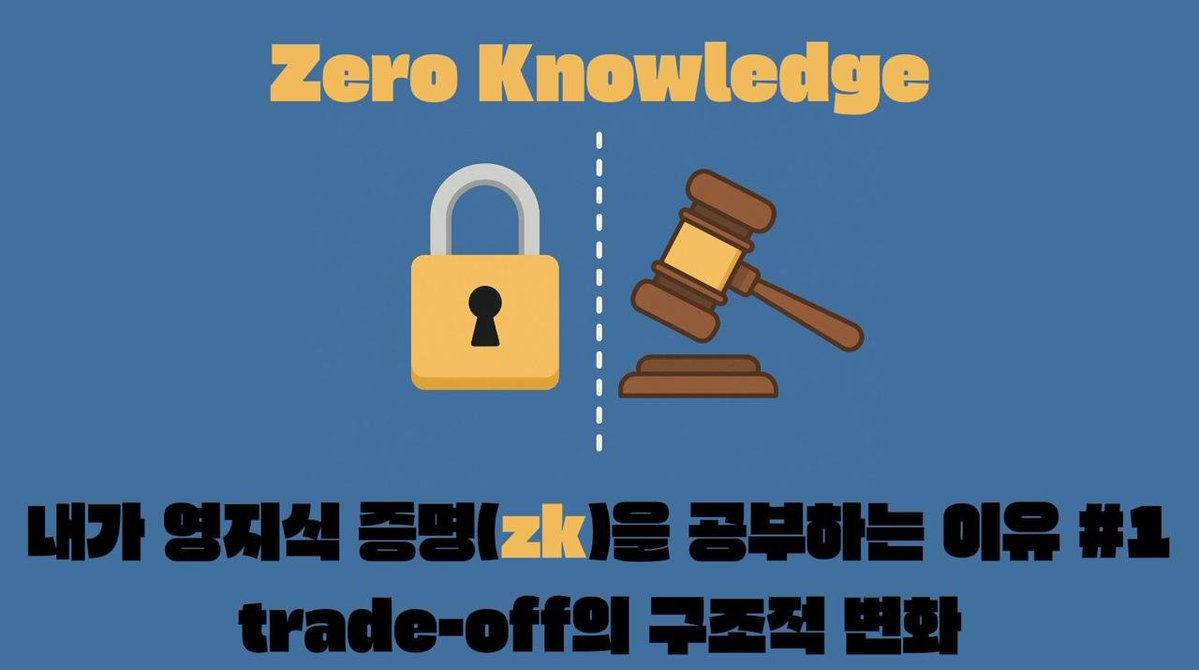📚 The reason I'm studying ZK #1: Structural changes in trade-offs
I am a BQ developer. @BQ_Developer
These days, I am deeply immersed in ZK (Zero-Knowledge Proofs).
At first, I thought it was just a simple encryption technique,
but once I understood it, my perspective on the problem itself changed.
Over the next few articles, I will summarize why I started studying ZK,
and why it holds significance beyond just technical learning.
The first point is about how ZK resolves existing technical trade-offs.
🔍 Trade-offs exist in all systems
One of the most frequently heard terms in software development is "trade-off."
- Strengthening security → Decreases usability
- Increasing speed → Raises costs
- Decentralizing → Reduces efficiency
Especially, privacy and verifiability have been considered the most pronounced trade-offs.
It was common knowledge that to prove something, you had to disclose information, and if you hid information, it couldn't be verified.
💭 Structure of existing verification methods
The way verification worked was simple:
1. A makes a claim
2. B requests evidence
3. A shows the evidence
4. B confirms it
In this process, B inevitably learns information.
So in practice, compromises were always necessary:
- To be audited, you must disclose your books
- To prove qualifications, you must present ID
- To confirm compliance, you must share internal data
🔓 What ZK changes
ZK changes the structure of verification.
Old: Show information → Verifier checks directly
ZK: Hide information → Prove only that certain conditions are met
For example, in loan assessments:
- Old: Disclose bank balance of 1,234,567 won
- ZK: Prove only "the balance is over 1 million won"
It may seem like a small difference, but it fundamentally changes the essence of verification.
The verifier can only confirm the necessary facts and cannot know more than that.
✏️ What actually changes
The specific differences created by this change:
Audit scenario:
- Before: Submit entire transaction history → Expose sensitive client information
- After: Prove only "all transactions complied with regulations" → Protect client information
In blockchain:
- Before: All transactions transparently disclosed → Give up privacy
- After: Prove only transaction validity → Maintain privacy
AI model verification:
- Before: Disclose model → Give up intellectual property
- After: Prove only "bias is below the threshold" → Protect the model
Combinations that were previously impossible are now becoming possible.
You can maintain secrecy while being verified.
This concept resonates with me on a deeper level.
It’s a new proposition that breaks free from the constraint of "having to choose one of the two" to "both are possible."
I interpret this as creating a new balance point somewhere between 0 and 1.
I believe most technological advancements have been like this. There aren't many magical solutions that solve all problems at once.
But what ZK shows is the possibility of "changing the degree of compromise."
And I believe only those who understand this possibility can create the next level of improvements.
This is why I study ZK.
In the next article, I will talk about another change brought by ZK.
---
Your likes and shares are love 🥰
#BQDeveloper #ZK #ZeroKnowledgeProof #TurningImpossibilitiesIntoPossibilities
Show original
1.61K
2
The content on this page is provided by third parties. Unless otherwise stated, OKX is not the author of the cited article(s) and does not claim any copyright in the materials. The content is provided for informational purposes only and does not represent the views of OKX. It is not intended to be an endorsement of any kind and should not be considered investment advice or a solicitation to buy or sell digital assets. To the extent generative AI is utilized to provide summaries or other information, such AI generated content may be inaccurate or inconsistent. Please read the linked article for more details and information. OKX is not responsible for content hosted on third party sites. Digital asset holdings, including stablecoins and NFTs, involve a high degree of risk and can fluctuate greatly. You should carefully consider whether trading or holding digital assets is suitable for you in light of your financial condition.

